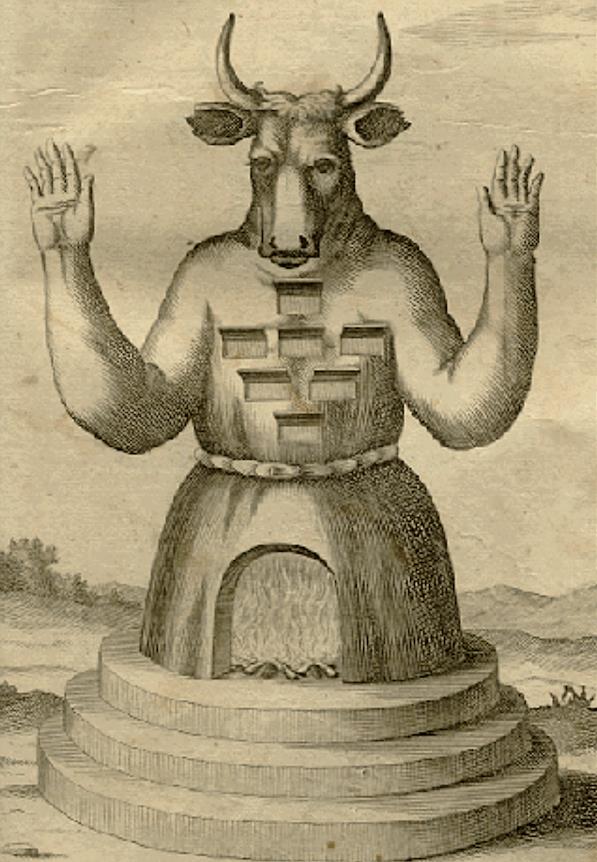

And thou shalt not let any of thy seed pass through the fire to Molech,There are no depictions or contemporary descriptions of Moloch. Yet medieval and modern sources tend to portray Moloch as a bull-headed humanoid idol with arms outstretched over a fire, onto which the sacrificial child is placed. This portrayal can be traced back to medieval Jewish commentaries, which connected the biblical Moloch with depictions of Carthaginian sacrifice to Cronus (Baal Hammon) found in sources such as the ancient Greek historian, Diodoros aka Diodorus of Sicily (Diodorus Siculus) 1st century bce.
neither shalt thou profane the name of thy God: I am the LORD.
Thou shalt not lie with mankind, as with womankind: it is abomination.
—Leviticus 18:21-22 kjv
“Some scholars have suggested that the term refers to a particular kind of sacrifice carried out by the Phoenicians and their neighbors rather than a specific god …”
Moloch is a name or a term which appears in the Old Testament several times, primarily in the book of Leviticus. Names from ancient times often have several variations—largely because different cultures had slightly different pronunciations and spellings and so on. Therefore, Molech is sometimes spelled Moloch or Molek. He is also sometimes known as Baal, although Baal means “lord” and thus could have been a reference to any foreign God, aka “false god”.
Some scholars trace the origin of this idol to the Phoenicians, who had a God they referred to as “mlk.”
“Melek” in Hebrew is a word for “king.” (Some claim the “-ech” in “Molech” is a variation of the suffix “-eth”). Thus, when researching “Molech” some references to the “king of shame” may pop up.
“Molech” was the reigning god of many tribes surrounding the Israelites in ancient times. In the bible, Molech is associated with the Canaanites.
Apparently, the ancient Israelites would add “eth” to other name to indicate shame, such as “Ashtoreth”. The name “Ashtoreth” could be interpreted to mean “shameful thing”. It was common for the Israelites to combine the name of Pagan Gods with the vowels in the Hebrew word for shame: bosheth.
“Asherah”—who held the position in the ancient Canaanite religion primarily as mother Goddess associated with groves, poles, and sacred trees, as well as Astarte—the ancient Phoenician/Syrian Goddess of love and fertility—were possibly both referred to “Ashtoreth”.
Scholars who do not believe that the word Moloch represents a deity instead compare the name to inscriptions in the closely-related Punic language--where the word “mlk”(“molk” or “mulk”) refers to a type of sacrifice.
Again, thou shalt say to the children of Israel, Whosoever he be of the children of Israel, or of the strangers that sojourn in Israel, that giveth any of his seed unto Molech; he shall surely be put to death: the people of the land shall stone him with stones. And I will set my face against that man, and will cut him off from among his people; because he hath given of his seed unto Molech, to defile my sanctuary, and to profane my holy name. And if the people of the land do any ways hide their eyes from the man, when he giveth of his seed unto Molech, and kill him not: Then I will set my face against that man, and against his family, and will cut him off, and all that go a whoring after him, to commit whoredom with Molech, from among their people. —Leviticus 20:2-5 kjvThese above verses from the King James Bible (kjv) constantly refer to:
“thou shalt not let any of thy SEED pass through the fire to Molech”
“thy SEED pass through the fire to Molech”
“he giveth of his SEED unto Molech”
This following speculation might seem very odd.
SPECULATION: Could it be that some men were masterbating and then tossing their “semen”, “ejaculations”, “bodily fluids”, or “seed”… into the fire as a fertility sacrifice?
Lori Stanley Roeleveld, Who was Moloch?, accessed February 10, 2023
DISCLAIMER: I am not a biblical scholar. However, I have heard all sorts of unusual theories about who Moloch was and/or what was this god's purpose. The one I heard fairly young, somewhere around age 10 to 12, explained that Moloch was a form of birth control for the city. If people had too many children, they would toss them in the fire to Moloch. That sounded wacko to me. More likely, an unwanted babe would be abandoned, either in a forest or at some place where someone who wanted a child would adopt it into the family.